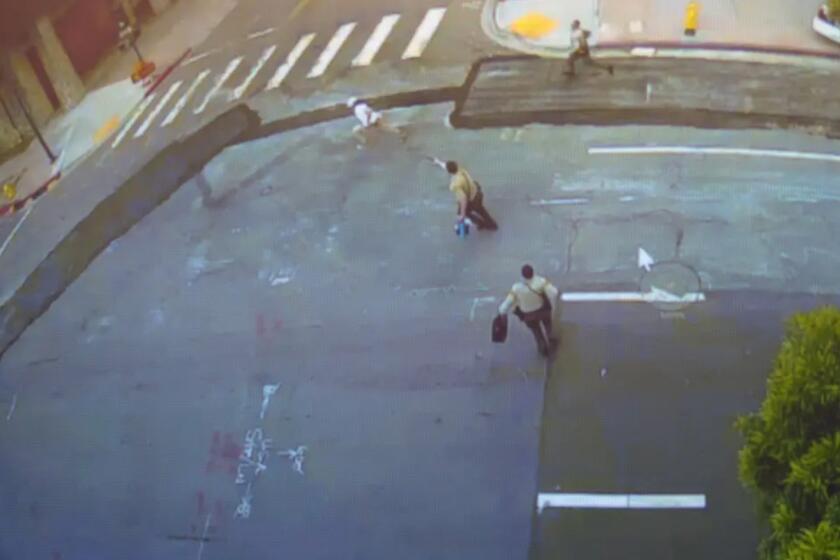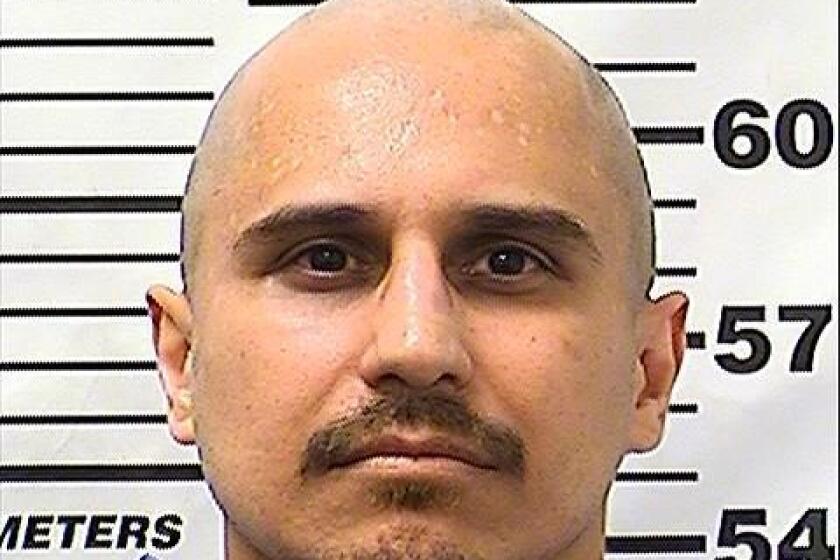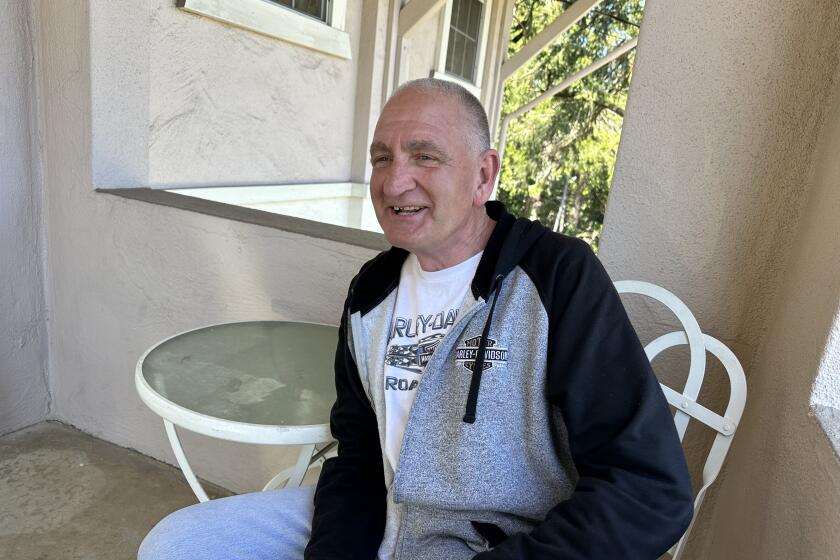Good Deed Ends Run of Luck
Vincent Pelliccia wouldn’t have been sitting in Los Angeles County Jail, shackled to his chair, if he hadn’t gone to his usual Studio City hangout to meet with old friends and colleagues from the movie industry.
A friendly gesture cost him his freedom. He agreed to give a ride to a man he knew only slightly, who, it turned out, was under surveillance by Los Angeles police in an unrelated investigation that has not been publicly described.
When curious officers ran a check on Pelliccia’s license plate, they discovered he was wanted for escaping in 1946 from a chain gang at a Virginia prison, where he was serving a 10-year term for burglary.
Interview in Jail
In an interview in jail Friday, Pelliccia said he never felt like a hunted criminal during his decades of freedom, yet his past occasionally nagged him.
“I never felt anyone was looking for me,” said the 62-year-old retired movie studio electrician from Newhall.
“But it always stayed in the back of my mind.”
In the early 1950s, he turned his renegade life around, taught himself electronics, raised five children and stayed out of trouble, he said. He did nothing to hide his past from authorities, having been assured by his attorney years ago that his fugitive status had been “straightened out.”
Pelliccia’s past caught up with him when a computer check by Los Angeles police revealed that he was still considered a fugitive because of the escape. He was arrested Aug. 4, jailed without bail, and now awaits an extradition attempt by Virginia authorities who want him to serve the nine years remaining of his sentence.
The possibility of spending more time in a Virginia prison for a burglary he was convicted of when he was 19 has Pelliccia in shock.
“I’m still walking around in a daze,” he said. He doesn’t understand why Virginia authorities would want to imprison him if rehabilitation is their goal. “I’ve had enough punishment just in this arrest,” he said.
Because he is a fugitive, only a 20-minute daily walk relieves his solitary confinement. Whenever he leaves his cell, he is shackled--just as he was in 1946 when he served time on the chain gang for “store-breaking.” Re-arrested fugitives are not eligible for bail.
“I never realized how notorious I was,” he wisecracked. He talked of his 28 years as a studio electrician, recalling what he described as a warm friendship with the late Jack L. Warner of Warner Bros. and Warner’s wife.
For a time he was Warner’s personal electrician, he said, and often went to the motion picture mogul’s home for jobs, such as setting up elaborate Christmas lights.
He went on location to Connecticut for the filming of “Who’s Afraid of Virginia Woolf?” which starred Elizabeth Taylor. An old newspaper clipping shows him escorting Taylor’s young daughter to a hotel.
Colleagues Ignorant of Past
When he retired from the Burbank Studios three months ago, he was a foreman in charge of up to 40 people, none of whom knew about his past.
The arrest was a shock for a man who became successful despite growing up with nine brothers and sisters in the slums of Providence, R.I.
“If they intend to put him in prison, they might as well give him the death penalty, because I know it would kill him,” said his daughter, Sally Pelliccia, 31, at the jail.
As was the case with his four other children, Sally Pelliccia, who lives in the Boston area, knew nothing about his Virginia prison term or his release in 1953 from a Rhode Island prison where he served about six years for burglary.
As a child growing up in Newhall, she remembers her father as a strict disciplinarian who forbade his daughters to wear lipstick. Yet, thanks to his mechanical skills, the family’s backyard was a playground. He used discarded pipes and other material to build a climbing gym, a two-story fort and a sophisticated swing operated by a pulley system, his daughter said.
“He was a born engineer,” she said.
In the early 1950s, he built a television set from scratch, she said. He hand-carved a cabinet and wired the device, presenting the creation to his parents. It wasn’t until a few days ago that his daughter realized that he had accomplished the feat while in prison.
Dropped Out of School
“He quit school in the seventh or eighth grade,” she said. He wasn’t one to indulge in self-pity, she said.
“If he told me once, he told me a hundred times: ‘If you fall in a hole, pick yourself up, wipe yourself off, and don’t look back.’ ”
She said her parents, who divorced in 1970 when she was 15, instilled a strong value system in their children. All are successful professionals, she said, including an engineer, a nursing student and an electrical designer.
When she was 16, she heard stories about her father’s past from other members of the family, but “I didn’t believe he’d escaped from a chain gang,” she said. “I thought the stories had been embellished over time.”
She did not hear the whole story from him until she came to Los Angeles after his arrest. “It hurts him to open up and talk about it,” she said. “It was buried so deep, he had all but forgotten about it.”
Governors Talking
What will happen next is still uncertain. There is “some dialogue” going on between Gov. George Deukmejian, who could block Pelliccia’s extradition, and Virginia Gov. Gerald Baliles, who has the power to pardon Pelliccia, according to Mark Gottesman, Pelliccia’s attorney.
He said Virginia authorities are reluctant to discuss how much time, if any, Pelliccia might have to serve on his old sentence if he is extradited to Virginia. However, earlier this week, Gottesman petitioned Deukmejian to block his client’s extradition. An extradition hearing is set for Sept. 4 in Los Angeles Municipal Court.
Virginia Department of Institutions officials say they have little choice but to extradite a fugitive, even though the warrant is 41 years old. “We didn’t have the authority to forget it and there is no procedure for us to drop it,” Wayne Farrar, public information officer for the department, has said.
Served 4 Months
Virginia records show that Pelliccia served four months of a 10-year term before escaping May 26, 1946, from a road camp in South Hill. Records say he cut through his shackles and a wire fence surrounding the camp and walked away at midday.
Gottesman said Virginia authorities tried to extradite him from Rhode Island in 1952. However, that request was denied by Rhode Island’s governor in 1953. The former governor is dead, and there is nothing in the record to show why he denied the extradition request, Gottesman said.
“I felt then that I had nothing to worry about,” said Pelliccia, who was advised by Gottesman not to talk about his convictions in Virginia and Rhode Island and his escape.
“I put it away in my mind.”
Except for two traffic tickets, “I never did anything to run afoul of the law. I went to work. I paid my bills,” he said.
“I want the pleasure of walking out of jail. That’s the greatest freedom of all.”
More to Read
Start your day right
Sign up for Essential California for news, features and recommendations from the L.A. Times and beyond in your inbox six days a week.
You may occasionally receive promotional content from the Los Angeles Times.






